Key takeaways:
- Ethical marketing is rooted in honesty, transparency, and social responsibility, fostering consumer trust and loyalty through genuine practices.
- Brands that engage in transparent communication and actively seek consumer feedback create stronger connections and enhance their reputation.
- Successful ethical marketing campaigns resonate with consumers by aligning brand values with social causes, as seen in cases like Ben & Jerry’s and TOMS Shoes.
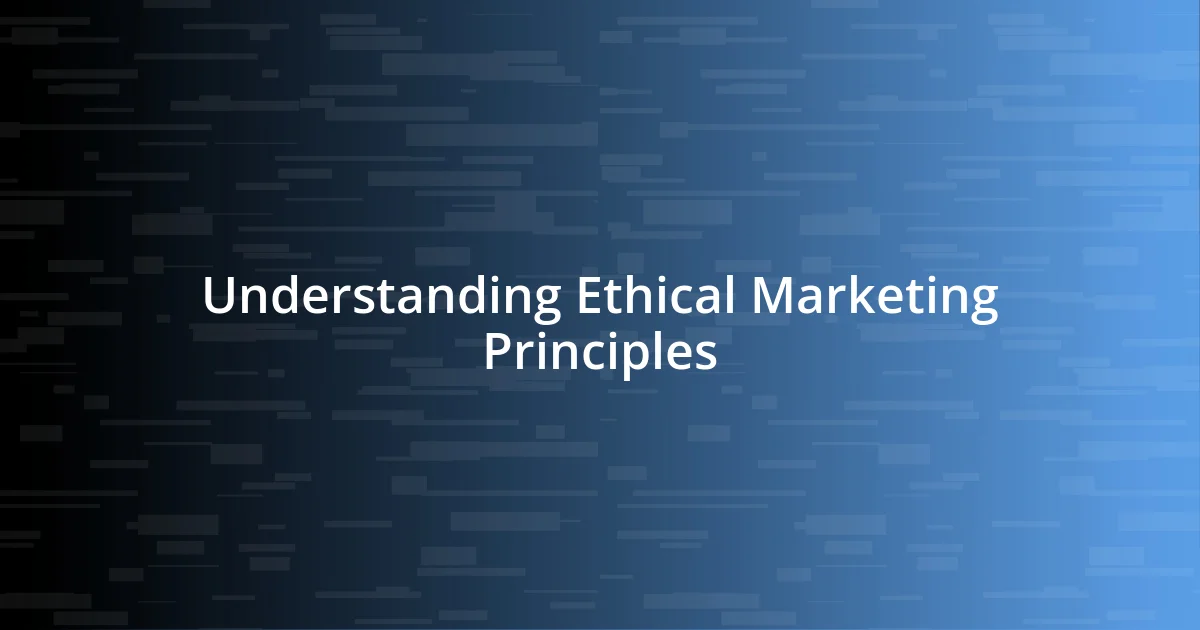
Understanding Ethical Marketing Principles
Ethical marketing principles revolve around honesty, transparency, and respect for consumers. I remember feeling uneasy when I once bought a product that was marketed as environmentally friendly only to discover otherwise. Have you ever felt misled by a marketing claim? It’s moments like these that really highlight the importance of integrity in advertising—consumers deserve to trust what they’re buying.
Another crucial aspect is the idea of fairness. I often reflect on how a brand treats its customers and competitors. For example, a company that uses deceptive tactics to overshadow its rivals might achieve short-term success, but it can lose consumer trust in the long run. Isn’t it more satisfying to support a brand that plays fairly and values its relationships?
Finally, social responsibility plays a vital role in ethical marketing. I’ve seen businesses that actively support community initiatives, and it truly resonates with me. It’s encouraging to think that every purchase I make might contribute to a positive impact in the community. Doesn’t it feel good to back brands that reflect our values? This holistic approach to marketing not only builds strong customer loyalty but also nurtures a sense of belonging within a community.
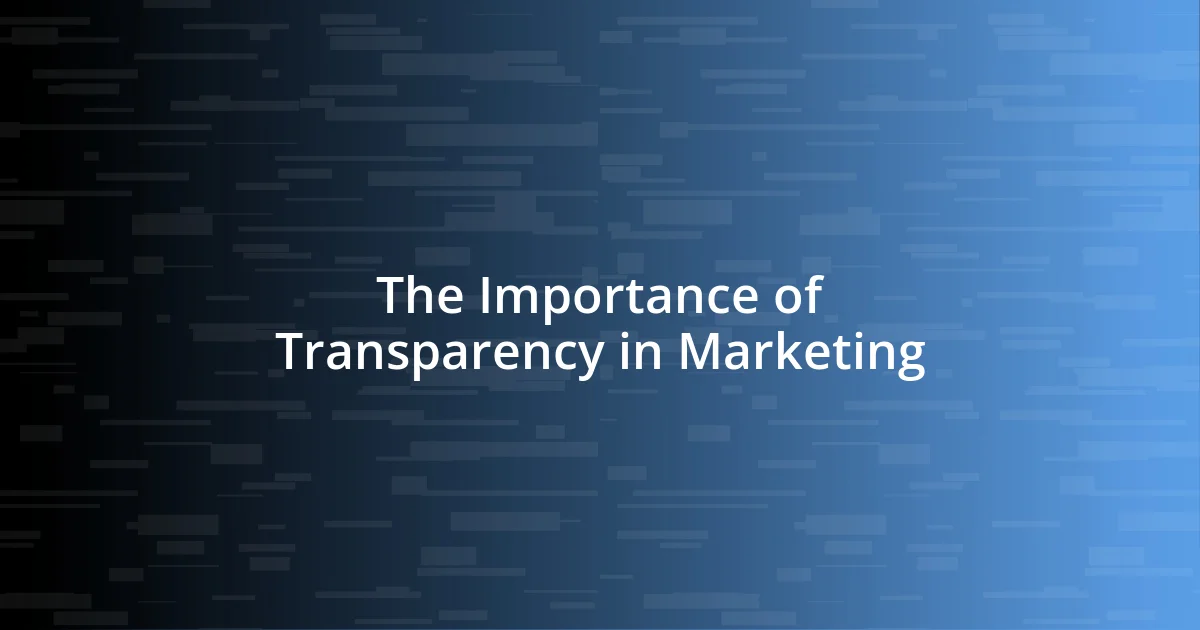
The Importance of Transparency in Marketing
When I think about transparency in marketing, I remember a friend who once bought an online course promising quick financial success. He later found out that the ‘success stories’ were exaggerated testimonials. It was disheartening to witness his disappointment, and it drove home the point that transparency can make or break consumer trust. Authenticity in marketing isn’t just about saying what you’re selling; it’s about creating a culture of honesty that consumers can rely on.
- Builds customer loyalty: Clear communication fosters trust, leading to repeat customers.
- Reduces conflict: Transparency helps manage expectations, preventing misunderstandings.
- Enhances brand reputation: Companies known for transparency often stand out in crowded markets.
- Encourages feedback: Open dialogue invites consumers to share their thoughts, improving products and services.
- Drives informed decision-making: When consumers understand what they’re buying, they feel empowered to make choices aligned with their values.
In my experience, I find that transparency serves as a bridge in marketing relationships. The more open a brand is about its practices, the easier it is for consumers to engage authentically. I feel that brands that embrace transparency often share their challenges and successes alike, creating a more relatable and human connection.
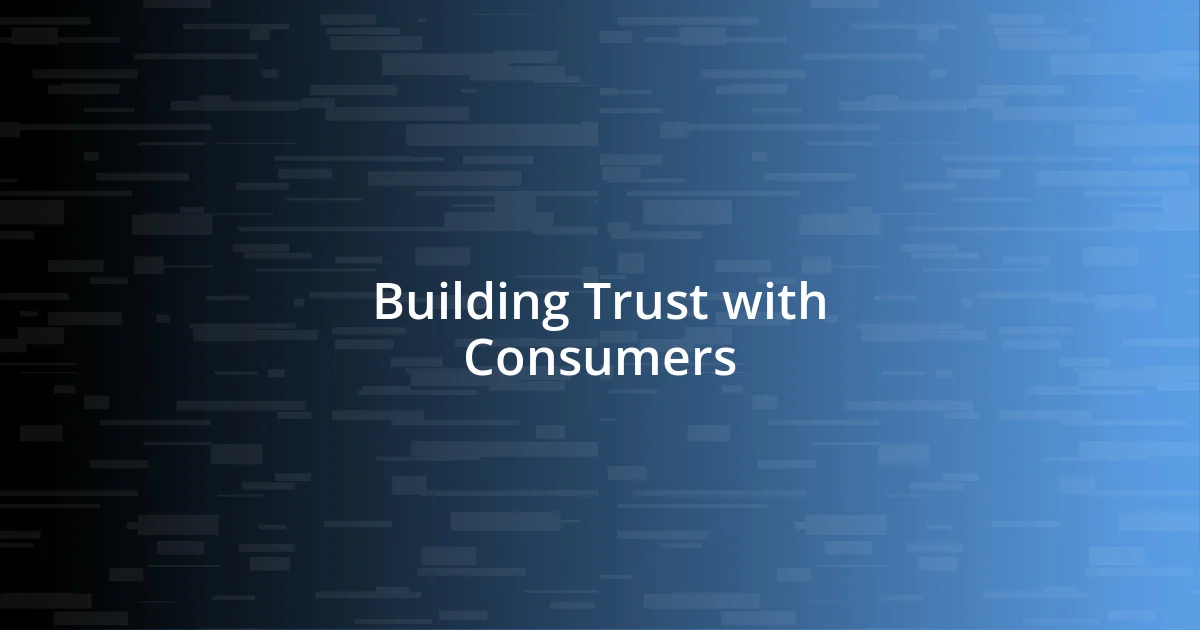
Building Trust with Consumers
To build trust with consumers, brands must prioritize consistent, honest communication. When I recall a time I received exceptional customer service during a product issue, it reinforced my faith in that brand. Their willingness to listen and resolve my concerns reminded me that when companies genuinely care, it creates a lasting bond that keeps customers coming back.
Moreover, the significance of delivering on promises cannot be overstated. I once chose a product because it was heavily advertised as having impressive features. To my delight, it exceeded my expectations! This experience made me realize how crucial it is for brands to meet or surpass the commitments they make. Trust flourishes when expectations are consistently fulfilled.
Finally, engaging with consumers through feedback channels is essential for fostering trust. I’ve seen companies that actively solicit reviews and genuinely consider them to improve their offerings. It’s refreshing to feel like my opinion matters and that the brand values consumer insights. This interactive approach not only cultivates loyalty but also builds a community of satisfied customers who feel involved in the brand’s journey.
| Trust-Building Action | Impact on Consumers |
|---|---|
| Honest Communication | Creates lasting bonds |
| Consistent Delivery on Promises | Builds reliability and loyalty |
| Engaging Consumer Feedback | Fosters a sense of community |
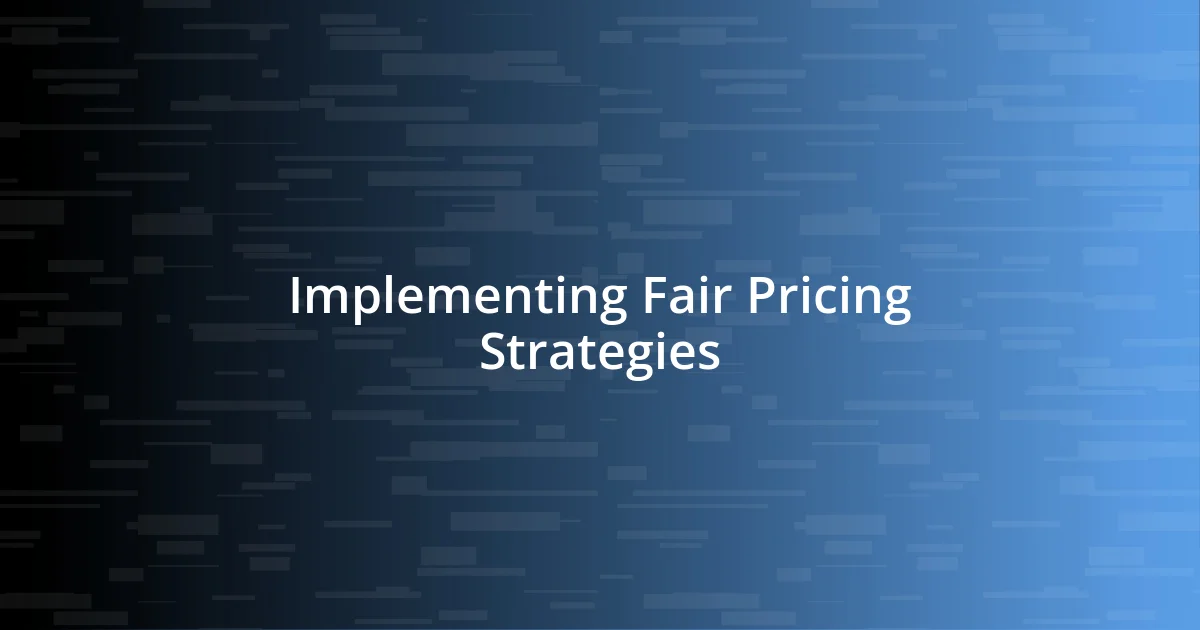
Implementing Fair Pricing Strategies
When discussing fair pricing strategies, I can’t help but reflect on my experience with a local coffee shop that adjusted its pricing based on customer feedback. Initially, I felt their prices were a little steep for a small town, but hearing their reasoning around sourcing high-quality, ethical beans made me appreciate the value behind it. This transparency not only justified the pricing but turned me into a loyal customer who frequently chooses them over larger chains.
I’ve also seen companies embrace tiered pricing models to cater to different customer needs effectively. For instance, a software company I use offered a basic version at an affordable rate, allowing me to test the waters before investing in the premium package. This not only made me feel included in their pricing strategy but also allowed me to make an informed choice about what I truly needed—prompting an organic loyalty that worked both ways. Isn’t it refreshing when businesses recognize the diversity of consumer circumstances?
Finally, I’ve encountered brands that promote seasonal discounts or community-specific pricing. A local bakery I love often runs specials during slower weeks, benefiting both the business and the budget-conscious customer. It’s this kind of thoughtful pricing that resonates with me; it feels like they care about their community, not just their bottom line. What could be more ethical than nurturing a sense of belonging while making sure that everyone has access to what they love?
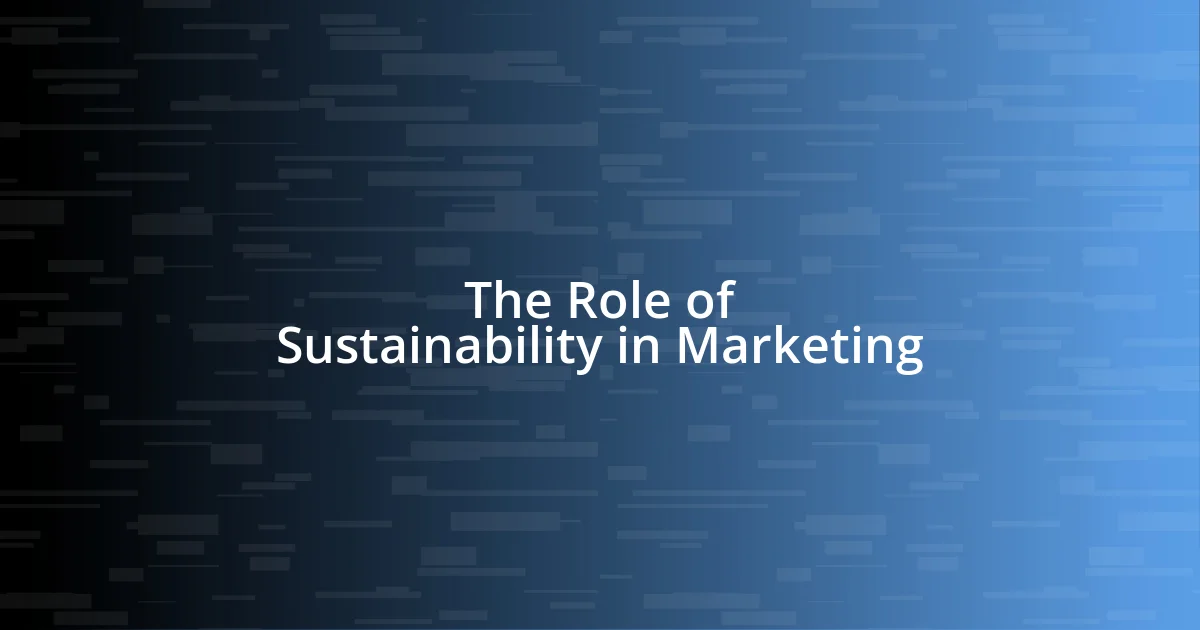
The Role of Sustainability in Marketing
Sustainability plays a pivotal role in modern marketing strategies, resonating deeply with consumers today. I remember when I purchased a reusable water bottle from a brand committed to environmental responsibility. They not only marketed the bottle’s features but also highlighted their efforts in reducing plastic waste. That connection to a greater cause made my choice feel meaningful, demonstrating how sustainability can elevate a brand’s appeal.
Additionally, I’ve noticed that companies that embrace green practices often attract a loyal customer base. When I see a brand using biodegradable packaging, I can’t help but feel a sense of pride in supporting their efforts. There’s a surge of positive emotion that comes with knowing your purchase contributes to a healthier planet. Wouldn’t you agree that supporting companies with genuine sustainability initiatives fosters a deeper emotional connection between the brand and its customers?
Moreover, the impact of sustainability on customer trust is profound. For example, after reading many brands’ impact reports, I gravitated towards those transparently sharing their environmental goals and progress. It’s inspiring to witness companies fight for eco-friendly practices while inviting consumers to be part of that journey. This collaborative spirit creates a sense of ownership among customers, making us feel like we’re part of something larger, and pushing brands to truly live up to their sustainable promises.

Case Studies of Ethical Marketing
One standout case in ethical marketing that comes to mind is the Ben & Jerry’s ice cream company. They’ve long championed social justice causes, and I recall feeling inspired when I learned about their commitment to fair trade. It wasn’t just about enjoying a delicious scoop; it felt like I was supporting a company that truly stood for something meaningful. Isn’t it refreshing to see companies walk the talk and make a real difference in the world?
Another compelling example is TOMS Shoes, which popularized the one-for-one business model. Each time I bought a pair, I knew that someone in need received a pair too. This kind of reciprocity not only made me feel good about my purchase but also created a personal connection to the brand. Have you ever found yourself rooting for a brand simply because they made you feel like part of a noble mission?
Lastly, I think about Patagonia’s dedication to environmental activism. Recently, they made headlines for pledging to donate their profits to climate change initiatives. I remember feeling a swell of pride every time I wore their gear, knowing my choice supported a company that is so deeply committed to the planet’s well-being. This kind of commitment resonates; it’s a reminder that ethical marketing reaches beyond products—it’s about building a legacy rooted in shared values.

Tips for Developing Ethical Campaigns
To develop ethical campaigns, it’s essential to align your brand’s messaging with its core values. I often reflect on my experiences when brands genuinely embody their stated principles. For instance, I once encountered a local coffee shop that promoted fair trade practices; they shared captivating stories about the farmers who grew their beans. It made my morning coffee feel special, transforming a simple ritual into a celebration of community and equity. Have you ever felt a personal connection to a brand that goes beyond the product itself?
Transparency is another critical factor in ethical marketing. I remember when a beauty brand I loved rolled out a campaign openly discussing their sourcing practices, including the challenges they faced. This level of honesty made me respect them even more. When companies embrace vulnerability and share their journey, it fosters trust. Don’t you find that knowing a brand’s authenticity can enhance your loyalty to them?
Lastly, engaging consumers in meaningful conversations can significantly enhance your campaign’s ethical aspect. A clothing brand I follow recently launched a hashtag campaign inviting customers to share their sustainability tips. This not only encouraged community participation but also made me feel that my voice mattered. Engaging your audience in this way sparks dialogue and shared learning. How often do you see brands doing that, and how does it make you feel about their commitment to transparency and ethical practices?














